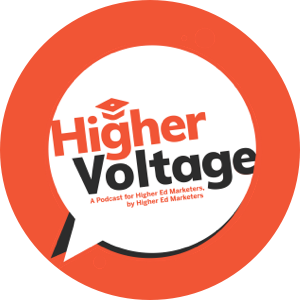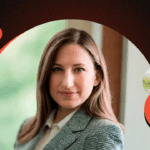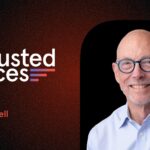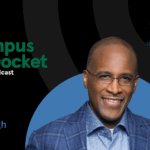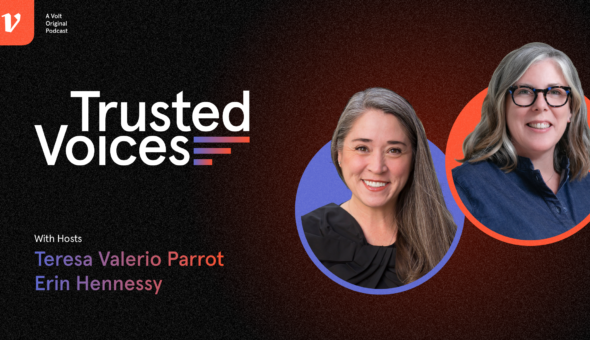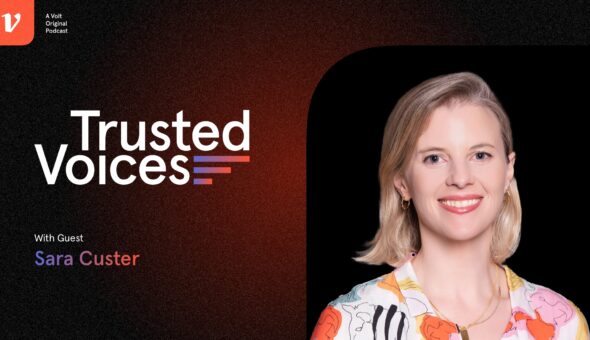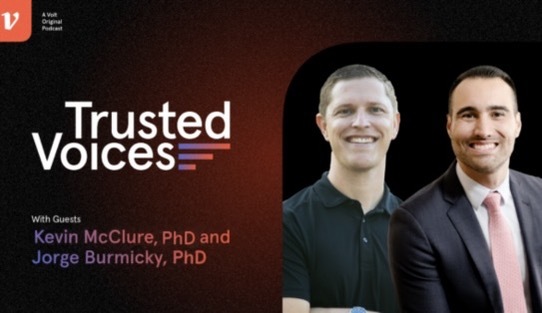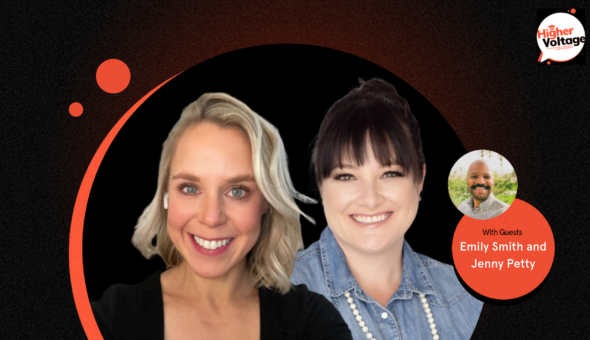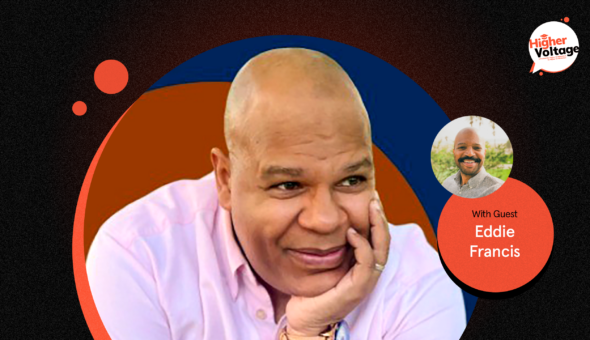In the first episode of 2024, Higher Voltage host Kevin Tyler sits down with Bennie F. Johnson, the CEO of the American Marketing Association (AMA). As a self-proclaimed “marketing kid,” Bennie explores the vulnerability of the marketing industry, especially in higher education, addressing common misconceptions and emphasizing the crucial role of expertise in the field.
They dive into the goals of the AMA and explore higher education marketing, taking time to focus on measurable results and the role of marketers in product development. Uncover Bennie’s vision for AMA in five years and its commitment to being an essential resource and community for marketing professionals.
Show Notes
American Marketing Association
Read Full Transcript
Kevin Tyler:
Welcome back to Higher Voltage. I know it’s been a little while since we’ve been together. Happy New Year to all of you. I hope your 2024 is off to a great start.
I’m so pleased, so pleased to welcome our first guest of the year, Mr. Bennie F. Johnson, CEO of the American Marketing Association. Bennie is a veteran marketing strategist and community builder with loads of knowledge in marketing and design and business strategy, as a visionary global association leader with a strong track record of innovation and impact, and as a transformative executive driving change and building dynamic partnerships.
Bennie, thank you so much for joining us on Higher Voltage. It’s so great to have you here. Please share more about your background that I didn’t cover in your intro that you’d like people to know.
Bennie F Johnson:
Oh my goodness, just thank you so much for having me. I think, and providing the platform for us to have a conversation, this is incredible. We joked about bios, it’s always weird when you hear the bio and the bio, you’re Mr. Johnson, but I’m just, I’m just, I’m just Bennie, but, and it’s fun to have that moment because, when you’re going through and kind of building a life and career, you don’t think about those moments in this way, but it’s kind of fun to have that moment to look back.
I grew up as a kid who always loved marketing. And that was how I kind of integrated with the world, marketing and entrepreneurship. I wanted to start a business when I was a little kid. That’s the thing that I always did. I always embraced it. So as you go through life, getting the call to have the opportunity to be the kid that loves marketing, to be the CEO of the marketing association, was that kind of dream within the dream within the dream come true. So today I’m excited. I get a chance to help other people who have a passion for marketing grow and excel, I get to help organizations do that. But I’ve also been a practitioner and a student and a brand nerd and all the things that go along with making us successful marketers today as well. So, you know, this is good. And then I get to have fun conversations with you.
Kevin Tyler:
Exactly. Well, I’m excited for this one as well. There’s so many things to talk about right now, not just in marketing and higher ed, but marketing kind of in general, which I’m really glad and happy to chat with you about in a little bit.
My introduction to AMA is of course, through AMA Symposium for Higher Education, which I first attended maybe 2019, maybe 2018, I think, and immediately was like, I need to get involved with this. This is a very important group of people that I need to connect with and learn from.
Bennie F Johnson:
Yes.
Kevin Tyler:
And now I serve on the AMA planning committee, which I’m honored, honored to be a part of. So I’m excited to talk to you about where we see higher ed marketing currently, but also how other kinds of marketing can inform the direction higher ed marketing can go. Because I think we can borrow a lot of those learnings from other industries in the work that we do for higher ed.
Bennie F Johnson:
Oh, definitely. Definitely.
Kevin Tyler:
Yeah, totally.
Bennie F Johnson:
And often, you know, those are our best learnings, right? When we see these adjacent spaces, it gives us just enough different distance from our day to day to see the strategic jumps and opportunities, right? It’s just enough difference that allows you to be more aware.
But you know, I think there’s so much in the contemporary practice of marketing, regardless of community you’re in, right? That speaks to that, the power of strategy, of thinking through, of being bold, of setting yourself apart, of being authentic, content, you know, storytelling and strategies that reinforce that, right? How do we understand the, we talked earlier, you know, how do we understand both the science, the art and the magic that is marketing?
Kevin Tyler:
Yes, yes. Before we get to some more of that, I’m just kind of curious, well, since you said it, how you became a marketing kid, but also what got you to where you are today as the CEO of AMA.
Bennie F Johnson:
I don’t know, you know, I was a teacher’s kid. No one in my family was involved in business or marketing as well. My dad was a mathematician, early stage software engineer and pastor, so I understood, you know, work, power of academics and community, right? My mom was an educator and having a dad who’s a pastor and a mom who’s an educator means one thing, means that although I had two brothers in my household, we always had extra brothers.
My space was a space in which my house was like the center of community. So I learned a lot about kind of that power and saw my parents in volunteer roles. My dad with his university, he was on the board. He went to Wilberforce. So I learned a ton about the oldest historically run and operated African American university. That was a source of pride in watching my dad talk about that. My mom was an educator and is retired now. So she taught at K through 12 and the collegiate level. So we knew that.
Education was important in that. So then, insert me, the oldest child, focus on school and those things in there, but love to pull things together that didn’t exist before. Love to kind of say “what if”. Love to question and build things in. And like the idea of the agency that creating your own business created, right? And early on, I kind of was drawn to that. And the way I navigated that was all about marketing and brand. How do you create the better this, the faster that, the more efficient, the more dynamic that?
I didn’t have all the words, I didn’t have all the theories and the structure in there, but something really resonated for me in that space. And it just was a part of my kind of experience growing up and even looking, going into college and grad school, I look for spaces that would give me dynamism and opportunity. So I grew up public school kid in DC, really proud to be a public school graduate, but I’m also equally as proud to be a graduate of Yale.
And so growing up, I was the first student in my high school in about 30 years to graduate from a DC public school and attend Yale. And so giving me a really kind of dynamic prospect of having that group of friends who were coming from different backgrounds and seeing the world in that space really is how you think about marketing, right? It’s an empathy, it’s an understanding of how others move and make decisions. How do you build agency? For me, thinking of businesses and building was, this is a chance for me to create a better space. And so those ideas messaged around that.
And as I went on, I saw that, oh, marketing is an opportunity to create community, you know, in practice and in space we live in. It’s a way, uh, entrepreneurship doesn’t have to be just business entrepreneurship. It can be social good. It can be enterprise. It can be nonprofit or for-profit, but marketing can be used in all those spaces. And so I think a lot about how we can use the skills that come with marketing to help us lead in and through marketing in our world. You know, I think about when people come to me, some of the stuff we learn in marketing is problem solving. Creative thinking and engineering in there. How do we design solutions? You know, that applies everywhere. You know, and how do we use our marketing powers that are super indeed, but how do we use them for good and impact? S
o that’s been the space in there. I always sought organizations that were either brand new ideas and concepts or places that needed my help to spin it around. Now, my common joke with my team and those I’ve worked with is no one hires me to do the same thing that we’re doing before because my background was so different. It’s like, okay, if you’re hiring Bennie, then you’ve committed to the fact that we’re going to radically change what we’re doing. This isn’t a question. I’m not the caretaker. I’m not going to continue what we’ve been doing in there. You’re bringing me in because you want to challenge the future. And so early on, that was kind of a distance space, right? It’s like, that wasn’t cool 20 years ago to be the person who was like, we’re going to break this all up and come up with something new and creative destruction.
But over time, you start to see being true to that, that this is what I thought about, that that’s what organizations need it. That’s what initiatives need it. That’s what programs need it, to have a more responsive, dynamic way of thinking about our world. So that’s kind of me thinking about it, you know, from the 30,000 foot view.
But Kevin, I’d be remiss if I’d say I thought about that all the way throughout. It was, wow, can I get the opportunity to do this? This is a great brand. This is a great product. Give me a chance. Right. But that was early on. It was all about giving me a chance. I remember one of my first jobs and CEO became a mentor and that great connection with them. I remember having to beg him to get a marketing job. And he said, well, you went to Yale, so you shouldn’t do marketing. You should work on Wall Street. And I was like, no, no, no, this is what, and we had to have this conversation where we basically, he was picking my brain on how to approach marketing and building product. And after he finished, he was like, yeah, you’re a marketer.
Kevin Tyler:
[Laughter]
Bennie F Johnson:
You know, but that kind of gap of taking all those experiences and showing up in unexpected ways to deliver outmatched impact is what’s really always driven me.
Kevin Tyler:
I like that. I am curious about how you characterize or describe how marketing has evolved since you’ve been involved in the industry and what you think is going to happen next for marketing as a prediction.
Bennie F Johnson:
Oh, that’s always fun, right? We get the prediction because we know in our hearts that we’re probably wrong, but we know in our hearts that we think we’re right, right? And the prediction in there. What I can say is that what’s confident is our world is dynamic and change is the constant, right? So I would say 25 years ago, it was like, oh, there may be this thing called change, right? And it was kind of, you sort it out, you know, sometimes it was happening, you weren’t aware of it, but it was there nonetheless and it was a longer arc, you know?
Thinking about how long, you know, things take, thinking about Moore’s Law and other spaces in there of change and adoption. Now you look at its space in there, change is the constant. And marketing for professionals, for teams, for organization is really on the cutting edge of all of those change dynamics, whether it’s new technologies, new approaches to technologies, new ways in which customers and audiences respond.
If all of those things are changing, and one of the things I firmly believe is, if we look at our world, and we see the future of business changing, right? We can see that business has been changing. We see the future of work changing, how we approach that changing. If we follow that as an equation, if the future of business and the future of work change, by definition, the future of the profession and the professional have to change.
Higher Voltage ad read.
Kevin Tyler:
So I love the way that you described the role of a marketer, especially coming from the perspective of business goals, right? All of those things that you just listed, yes, are in fact solved by marketing. What we often see, though, especially in corporate spaces, is when cuts need to be made, marketing is typically the first to go.
Bennie F Johnson:
Right.
Kevin Tyler:
And so how do we start to reposition the power of marketing, especially in vulnerable industries like the higher ed right now. How do we reposition the power of marketing in such a way so that people understand what it is capable of and that they don’t want to cut it?
Bennie F Johnson:
Yeah, this is one of those, “you’re gonna miss me when I’m gone” moments, right? And that you have that because sadly enough, that’s a historical piece that we take with us on the marketing space in there because it was the variable spin versus the fixed asset and spin, right? So if you’re making a cut, pushing the budget space in there, it’s hard to cut the facility because you’ve got that over the long term. It’s hard to cut the other pieces in there, but it becomes a accessibility space in there, right?
You’re hard pressed to cut technology because it’s a box in which no one really understands what’s going on. So which wire am I cutting, right? The finance, I’m not going to cut myself because someone has to be here to count the numbers, right? Uh, the CEO and executive leadership won’t cut themselves in there. It becomes a question of what are the things that become changeable? And the challenge is because our marketing spin is often variable, because it needs to reflect the goals and the space in there, we become the convenient, easiest cut, right?
And that’s, that’s not speaking anything that isn’t true and hasn’t been said and known deeply by anybody who’s in marketing. You’ve been there when we were like, don’t do it. It’s far more expensive to restart it again, right? Do we have the other faces in there? We’re delivering against the business goals in these other ways. Or my favorite part is, you deliver against the goals and it’s like, okay, well, we’re doing well, we’re meeting the goals every year. So magically that’s happening, right? So this product’s directing itself.
Kevin Tyler:
I agree with you on all those, but I think the other part of that conversation around why marketing tends to get treated the way it does is because everyone else thinks that they’re also a marketer.
Bennie F Johnson:
Right.
Kevin Tyler:
Everyone thinks that they can be a marketer.
Bennie F Johnson:
You know, what I was going to allude into in there through license and complexity, people don’t see themselves handling the money, right? Or the legal responsibility or the IT space because it seems messed up. But lots of people believe they can do marketing. And that may be a truism, but lots of people can’t do marketing well. And it is the adjective and the adverb of that, that gives you that doing it well, right? So it’s like, well, I can, I can do that.
And what we’ve seen when looking at the best practices, the emerging practices, all the work that we do is doing marketing well, doing marketing strategically and doing marketing right has an impact on your organization. And the impact can be short, mid and wrong, long range. It is a positive impact to go in that space in there. When you pull back and just kind of throw it out to like, anyone can touch on it. You get exactly what you’ve invested in.
Kevin Tyler:
Exactly.
Bennie F Johnson:
Which is a scattershot. So you can be space and, and I will quote my, my late grandmother who would love to say things like this, like a broke clock is right twice a day. So you can have, you know, so that’s a very analog, you know, statement for my grandmother coming from rural North Carolina. That means nothing to our kids right now who are having Apple watch and don’t have the hands to see the digital space in there, but you get the point here, right? That, that luck is not expertise.
Kevin Tyler:
Right.
Bennie F Johnson:
Right. And so, yes, I can always find a point of truth to say, well, we cut it in, we did something and something worked. But it’s not the same as expertise. And when you are working in a profession, a profession is built upon the expertise. That’s the art, the science, and the magic. It’s built upon that space that goes into it. And that’s why I love things like our symposiums that we have in the higher ed space. It was the first full AMA event that I attended as a CEO was coming in and walking in.
And although I wasn’t directly involved in higher education marketing, you could tell you’d found your people, right? There was something a bit about it that was community that was focused that you saw for lack of a technical term. I saw coaching trees. I work with this group and then I got promoted and I worked here and I worked here and people who saw a legacy in the work that we’re doing and you saw partnerships in, we have different communities and different audiences. I’m going to learn from your technique, you’re going to learn from my technique. We’re smaller universities, we see something together. We’re public and private, we see something way together. We’re operating under different types of resources, we see something together.
Kevin Tyler:
Right.
Bennie F Johnson:
And finding that space for that, which is really important. In organizations, we’ll make those mistakes. We don’t want them to. We want us to get smarter so you can learn from others, right? Not a good idea to cut your apparatus that increases your brand, your alumni engagement, your student application, and you’re probably not a good thing for you to do if you’re going to have a long-term success.
Kevin Tyler:
Right, right.
Bennie F Johnson:
And how many of us have seen it happen? And we grimace when we see our friends and colleagues go through that separation from the things that they love, from the mission that they’re supporting, because someone else doesn’t get the message.
Kevin Tyler:
Right, right. What do you think from based on your experience, all the things you’ve done, where you sit now, what are the biggest opportunities for higher ed marketing right now?
Bennie F Johnson:
Well, I think in higher ed marketing, we have a way, we have an opportunity to show that marketing matters and makes a difference, right? If we think about our universities and we think about our conversations, the stories are stories that you hear in a time of crisis, right? They’re the “what happens next.” Things are changing, my pipeline is different. There could be a dare we say, often used statement now, enrollment cliff, right? All those things are statements of crisis. And in crisis, you have that proverbial danger and opportunity, right?
And so I think that this is a space for marketing leadership to step up and use those skills that we talked about that are executive leadership skills to say this is how marketing has a contribution to the challenges we see ahead, right? I’m not one to say that marketing is gonna solve everything by itself because you don’t wanna go into it by yourself. You need to have a bit of Avengers, right? Everyone in Avengers has unique powers and skills but they’re better with all of them being together.
You know, and so we have a power and skill that we need to bring to bear, to have voices at the table, have direction that’s a space in there, but then bring our contribution to kind of solve these kind of challenging borders. And the challenge is not the same for every space, you know. Small liberal arts college has a different challenge than land grant institution has a different challenge than state research institution, large state college versus Ivy League, right? They all have different versions of the challenge that I believe that marketing has an answer for.
Kevin Tyler:
Right. Although the answer that we are able to communicate as marketers can only be as good as the raw material of the institution itself. Like if you’re not solving the problems on your campus, then we don’t have anything to market, right? And so we are the next step. We are not the only step to solve the issues. We can’t just say words, right? The words have to be attached to some sort of reality.
Bennie F Johnson:
Right, right. And you can actually market with hollow words. And I say this all the time. Just because you can do something, doesn’t mean you should, right? So you can, to be honest, you can do it. I wouldn’t advise it. It’s not sustainable. It doesn’t push you on the mission and impact. It is disingenuous with your audience. It erodes any credibility that you have, but you can do it. It’s a bad decision. And it’s a bad strategic decision, it’s a bad ethical decision, it’s a bad practice decision. Right?
And so that forces you to say, well, what is the unique proposition that we have these kind of core business things that we think about, right? They don’t go out of fashion. Like, why is this space in there? Not every school is for everyone, right? That’s the beauty of having diversified offerings in space. So where do we find that this makes sense for you? This makes sense for you in this space in here, because that’s what your audience are looking for. That’s what parents and students are looking for. You think about it, this is a vulnerable part in any journey in life decision. This decision matters, right? The decision matters to the student, to the family, to the community. That’s how I think about it.
We go back to our own experiences in going to college. That meant a lot, right? There was a community decision of my going to Yale. There was a family decision. It was a personal decision. It was also a decision to come back to grad school and what that means as well, right?
And so finding the space in there, I was talking to somebody before, I said, oftentimes, students are the first one to find the space that makes sense for them, before their teachers and counselors, before their parents, and we’ve always needed to identify to them. Right, so that kind of direct space, and if you look at our younger generations that we go into it, that authenticity is important, right? It needs to be authentic to the university and space in there. And I think you said it. If you’re not a space that fosters intellectual curiosity, you can’t have a campaign that talks about intellectual curiosity.
Kevin Tyler:
Exactly.
Bennie F Johnson:
It’s going to shine through. It’s going to be like, oh, that’s not cool, right? If you’re not a campus that fosters diversity, which I hope that every campus does, but sometimes the definition of diversity is stretched in many different ways, right? Don’t lean into the diversity that you’re not, in trying to space it. Because often, like I said before, you may not understand what’s unique about you as an organization. So then you’re doing, as my daughter said, you’re trying too hard, right?
Kevin Tyler:
Exactly. You’re doing too much.
Bennie F Johnson:
Doing too much. That’s the other thing that we say right after that.
Kevin Tyler:
I’m curious to hear some of your goals for the American Marketing Association. What are you trying to achieve under your leadership and how do you propose you’ll get there?
Bennie F Johnson:
Oh my goodness, a lot of hard work, some grit, imagination, and just determination. That’s how you get to anything in life that’s worth achieving, right? You’ll hear me say that no matter where I am. I say that to my kids, I say that to my friends, say to people out on the street, it’s that combination of those things, right? I always hire people who are smart, hungry, and creative, right? If you have those things together, then we can figure it out.
But to that end, I came in with the challenge of our space for us to grow our organization to be more reflective of a contemporary professional association. So what’s a contemporary professional association? It’s dynamic. It integrates communities, right? So students and teachers and faculty and practitioners and CMOs and independent contractors, how do we find ways to bring together a community that’s built on reinforcing practice?
So we understand how marketing grows and evolves. We recognize that we are a science and an art together. That’s what I love about a contemporary profession. We are all those things. We are also an aspiration as a profession. What I love about being in professional associations is we often answer that question, that age old question that we all had is, what do I wanna be when I grow up? At the end of the day, that’s what a professional association answers, right? It’s what I wanted to be as a young marketing kid. It’s what I wanted to be when I grew up. I wanted to be a CMO, I wanted to be the space in there.
I think building a professional association has to have that aspirational, inspirational arc as well, that carries you through the tough times of doing marketing preps when you’re not getting budget, that leads you to being the CMO of the global NGO that you’re interested in, right? Or moves you along the line of now being responsible for brand and engineering at a technology company. Those are all the things in there.
So I want to see the AMA really expand the vision that it has, which is being the essential community for marketing. And I love that it’s so pure in the language that it is. Essential is inclusive of everything, right? It’s all the things you need. It’s the convernations, it’s the support, it’s the challenge, it’s the knowledge, it’s the resource. Those are all things that are part of community, when community is powerful and successful. I think that that’s important. I think it’s also important for us to refine as a profession so that we have a voice of how we show up in the world, how we lead through and in marketing in the world, I think that makes sense.
We talk about conversations a day about technology and AI and privacy. Those are all ethical practice conversations that should be had in the marketing space, right? We do ourselves a disservice and we shy away from those spaces in there. We don’t get to do the ads and then not think about how it impacts people, right? That’s not a space I want you to be in. We don’t get to use all the data and not have a trust conversation about how you want your data to use. These are the professional ethical dilemmas in space in which we, as a practice, need to set our game rules. We don’t need anybody to regulate for ourselves. We self-regulate in that sense. So that’s what I want to build, a space where that happens. And hey, people find a home to be excited about marketing.
Kevin Tyler:
Yeah. What would you say are some of the biggest obstacles that exist right now between you and this goal that you just described?
Bennie F Johnson:
Time and space, right? Because we’ve got the determination. We’ve got a space. I tell my teams all the time, I’m greedy when it comes to being around smart people, right? I’m greedy about building teams and exciting space in there that I believe that we all have something to contribute. We all have space in there. And if you set the vision large enough and set it out there, that becomes what we push towards.
So it’s kind of time and space. We’ll build to that. We’re talking about some concepts that have been important, but we haven’t as an organization focused on them until recently, right? And once again, you know, going back to my premise, you don’t hire me to do the same thing you’ve been doing before.
So we, you know, I love the fact that our conference of higher ed conference now, our keynote was Dr. Marcus Collins, what he represents in our space is the difference of how we’ve structured. We’ve always had in the AMA, these silo communities. But Marcus is an engineer turned MBA practitioner turned PhD researcher who is both doing strategy at major global agencies with big clients but also running research and teaching. So he is all the communities in one and that’s more about what a contemporary practice looks like.
I talked to lots of folks who are like I’m working as a practitioner but I’m teaching a course, you know, I’ve been in school but I’m setting up my consultancy, right? That these lines never really mattered. Think about it, they were artificially put into that. But when you think about a creative practice and how you show up, you know, I know from the conversation with him and reading his book and everything else, his practice is influencing, his teaching is influencing his time with students influences his practice, right? And so marketing, marketing is a type of profession, it’s a contemporary profession that rewards that type of moving in, out and around.
We look at, kind of that having the distance, having the perspective. I was encouraging many of our higher ed marketing leaders to ask them how many of you have AMA chapters on their campus? And it was this kind of “aha” moment, not to shame anybody, but kind of sometimes the answers are right in your face. And we were having this executive forum to talk about how we can have more voice of the young customer, voice of the space in there, authenticity and storytelling and all the spaces that go along with it.
And raising that in a room of 100 people, a handful of people raised their hand. And I was like, you do realize you’ve got marketing students who are on your campus who would be incredible resources to be interns and junior staff in the offices there. And they’re literally across the campus. I had so many people come to me afterward and go, oh my goodness, I did not think about that. And I’m like, hey, I get the benefit of my position to see that X, Y, Z campus, you know, AMA student chapter is competing in the brand competition and killing it.
And the marketing department at the university is like, we’re having a hard time figuring out how to market. But I have that perspective and being in this unique role to say our answers are in each other, right? And that’s the power of community. Our answers are together. Imagine how much the students would learn from being in your office and imagine how much you can learn from bringing them in. So that’s the space of your example. That’s what I wanna grow and build on AMA until it powers in and on itself, right?
Kevin Tyler:
It’s a small town
Bennie F Johnson:
We are always not a 2 plus 2, but what do we do to amplify that? What is the exponential extension of that? So that’s what I want to do during my free time. It’s noble work.
I always grew up loving being a marketer and I want other people to have that, that love, right? And there’s opportunity and, and I see the connection and we talked about before, I like to build things that weren’t there before and see those opportunities. And that was just a great example where it was like, doesn’t cost us any money. All of a sudden you’ve got a focus group that needs experience that you can share. And all of a sudden there’s a resource that ties in and now our university space in higher ed is learning upon itself, right? Which is kind of a next level of a meta learning experience that I think that professional associations can help bridge in the gap, right? We spend four years in college and undergrad, sometimes five, right? And then we spend a couple of years in grad school if we do a professional education, but we spend more time outside.
But as you know, as you’re marketing university, you’re gonna spend a year or so recruiting people to school, another four or five while they’re in school, but the rest of their engagement is as an alum.It’s kind of this lifelong learning and engagement that goes into it. Professional organizations get to be a partner with you at that space. Like how do we keep pulling those things back in? How do we keep creating the learning prompts and opportunity?
Trusted Voices ad read
Kevin Tyler:
So we talked a little bit about what some of the biggest opportunities for higher ed marketers that exist now. I’m curious what you see the future of higher ed marketing to be or look like.
Bennie F Johnson:
You know, I think if anything with marketing in there, there’s gonna be a lot of focus on measurable results because that’s the language that everybody translates to. We’re all focusing on that. So that gets us out of like, we have our own language as many disciplines do. Sometimes we get the negative space in there like, hey, it’s marketing speak, but that’s a negative thing. I don’t see that as a negative space in there. I think we have language that we put into the business lexicon that’s important. I do sometimes think we have language that confuses people, right?
Kevin Tyler:
Right.
Bennie F Johnson:
And sometimes our language predates what other people know to be true, right? So we are talking about some stuff and people like, I have no idea. And then skip down 10 years, like, oh, that’s what that is, right? I think that, you know, we’re going to have to make sure we’re tied into the mission and the numbers. And in organizations, the mission and numbers should live in concert, right? They don’t sometimes, but we’re going to have to tie it in there because that’s going to show our value at the larger table and conversation.
You’ll have goals that you have to achieve, right? And that’s real talk that marketing can’t be absolved of being involved in that part of our operation and organization. But if we are, then we have, not only the permission, we have the access to lead at the table. Being, having a fluency in those, in that part of the business and the impact is really critical.
Kevin Tyler:
I totally agree. I was talking to someone not too long ago, sometime last summer, I think, and they posited that marketers, chief level marketers specifically, should have some influence on the product, like what that looks like. If you are, if we’re supposed to be so fluent in so many things as you so well described at the top of this conversation, then that information should be integrated with what the product looks like and feels like what the experience is for the end user. And I have been thinking about that since last summer. It makes sense. I mean, it would be another thing to add to the already full plate of a university higher ed marketer but it feels like it makes a lot of sense.
Bennie F Johnson:
Yeah, it really does. And just even being a part of the design for Space Center, I remember having a story one time early on when I was a brand management intern at a big consumer packaged goods company in Cincinnati. We just keep it nameless. We’re working on a product, and we’re working on a launch of a sensitive version of the product. But the package team, the design team, and the other part of marketing team hadn’t been brought into it until we were down the line. And so you were tasked with trying to adjust the product that was built with the old parameters, that was bulky and dark and heavy and deep navy blue, that they said, hey, make it sensitive. And so the solution ended up being put a pink flower on it.
And it was this experience as a young intern in brand furniture, like this might’ve been helpful if like this part of the system had been brought in earlier, if design had been brought in earlier, if the market space had been brought in earlier, because clearly there are some goals and spaces in there, then what was designed and what dealt with the end was not the optimum success, right? And it doesn’t mean that marketing has to be the engineer of the idea and building it all out, you know, but in a racy model, we should be somewhere in that conversation.
Kevin Tyler:
Right, right.
Bennie F Johnson:
You know, we might have a point there and go, yeah, we’ve seen that sounds right. But when it’s introduced in the marketplace, it doesn’t really work, right? Or interesting point, if you consider that, or wow, great, I got a heads up, this is coming down. This is going to fundamentally change the way we communicate with parents. Which isn’t a bad thing, but it’s a material thing, right? You know, and having that, that guidance and insight in there, it may give you a headstart of redeveloping how we communicate.
Kevin Tyler:
Mm-hmm. Before we wrap, I have one more question. And that is…
Bennie F Johnson:
Okay, all right. You don’t wanna talk to me anymore, my friend?
Kevin Tyler:
I would love to, but I want to be respectful of you too. We have five minutes left. You’re a busy man. What does AMA look like in five years?
Bennie F Johnson:
Oh my goodness, I want it to look like what we just stopped, the Contemporary Professional Association for Marketing. I want it to be a place that is a resource that you go to help you with what you need today and help you think about what you need tomorrow. I want it to be a space that’s both aspiration and inspiration of what can we be, what can you do, what can we create.
And I want it to be a space that’s committed to a generative and evolving profession, right? I want anyone who has an inkling that they want to be involved or need to be involved in marketing to feel like they have a lane to enter. Whether you’re a student at a four-year university or coming out of community college or an influencer who just created your first video, I want this to be a space. Whether you’re the dean or the CMO, that you see space and find value that is marketing. That’s my goal. For me, that’s a contemporary professional association. It brings it all in together and it’s essential.
Kevin Tyler:
I love that. I love it. I will say from a very personal perspective that working in an industry where there are so few people who look like me, having a CEO who looks like me of an organization that represents the industry that I’m in is wild to me. It is important to me. It strikes me. It’s important. And so I thank you for your service to the industry, to the organization.
I am honored to be a part of the planning committee for the higher ed symposium that AMA hosts every year. I will say to our listeners, we have started the planning process already. We just left Chicago in November and we were scheduling the first planning meetings as we speak. So be on the lookout for 2024 materials for session applications, for sponsorship opportunities, decide who’s going to go.
Last year, we had the largest gathering of higher ed marketers in the history of AMA. And so we’d like to top that this year. So be on the lookout for some things coming out in the, in the coming months. Uh, but Bennie, thank you so much for joining me on Higher Voltage today. It was an honor and a pleasure. And we are excited to see what happens next with the organization.
Bennie F Johnson:
Well, Kevin, I appreciate it. Thank you for the warm words, your dedicated service, and this platform to engage in conversations that matter. Look forward to seeing you in person in Las Vegas this year, because we’re going to have the largest of the largest. We’re going to best this year, and it’s all about bringing community to move us forward. So thank you.
Kevin Tyler:
Thank you.
